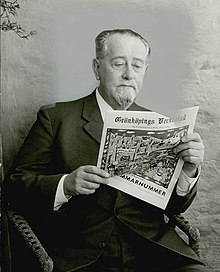Grönköpings Veckoblad
 Editor Seth Bremberg reading the magazine | |
| Categories | Satirical magazine |
|---|---|
| Frequency | Monthly |
| Founder | Hasse Zetterström |
| Founded | 1902 |
| Country | Sweden |
| Based in | Stockholm |
| Language | Swedish |
| ISSN | 0017-4548 |
| OCLC | 497440061 |
Grönköpings Veckoblad is a Swedish satirical monthly magazine. The name translates as "The Grönköping Weekly", or "The Greenville Weekly", Grönköping being a fictional Swedish town.[1] The name Grönköping predates the magazine; it was first used by Albert Engström as a headline for some of his drawings in 1895.[2]
History and profile
Founded in 1902[1] by Hasse Zetterström as a supplement to Söndags-Nisse, it became an independent magazine in 1916. As of 2008 the editor in chief of the magazine was Ulf Schöldström.[3] The magazine is based in Stockholm.[4]
The parody language Transpiranto, a caricature of Esperanto, was introduced in a 1929 article by Nils Hasselskog, "World language in Grönköping's school" ("Världsspråk i Grönköpings skola").[5]
Grönköping has been characterized as a Sweden in miniature. Using bombastic and anachronistic language while purporting to describe and analyse current events in a serious manner, Grönköpings Veckoblad has become a Swedish institution and a standard for what is considered good satire.[6]
The declared editorial stance is that they "always agree with the government, especially when they are wrong."
See also
References
- ^ a b Salvatore Attardo, ed. (2014). Encyclopedia of Humor Studies. Los Angeles, CA; London: SAGE Publications. p. 473. ISBN 978-1-4833-4617-5.
- ^ Martin Kylhammar; Göran B. Nilsson (1997). Det klassiska Grönköping: Idyller och paniker (in Swedish) (1st ed.). Stockholm: Fischer & Co. p. 9. ISBN 91-7054-835-8.
- ^ TTSpektra (8 September 2008). "Ny chef för Grönköpings Veckoblad". Östgöta Correspondenten. Archived from the original on 7 August 2011. Retrieved 22 February 2009.
- ^ "Grönköpings Veckoblad". Sveriges Kulturtidskrifter (in Swedish). Retrieved 2 April 2020.
- ^ Gunilla Byrman (20 October 1997). "Europanto eller svenska?". HumaNetten (in Swedish). Retrieved 27 October 2016.
- ^ Martin Åberg (2006). Politikern i svensk satir 1950-2000:Från folkhemspamp till välfärdsmanager (in Swedish) (1st ed.). Lund: Nordic Academic Press. pp. 57–58. ISBN 91-89116-83-6.
